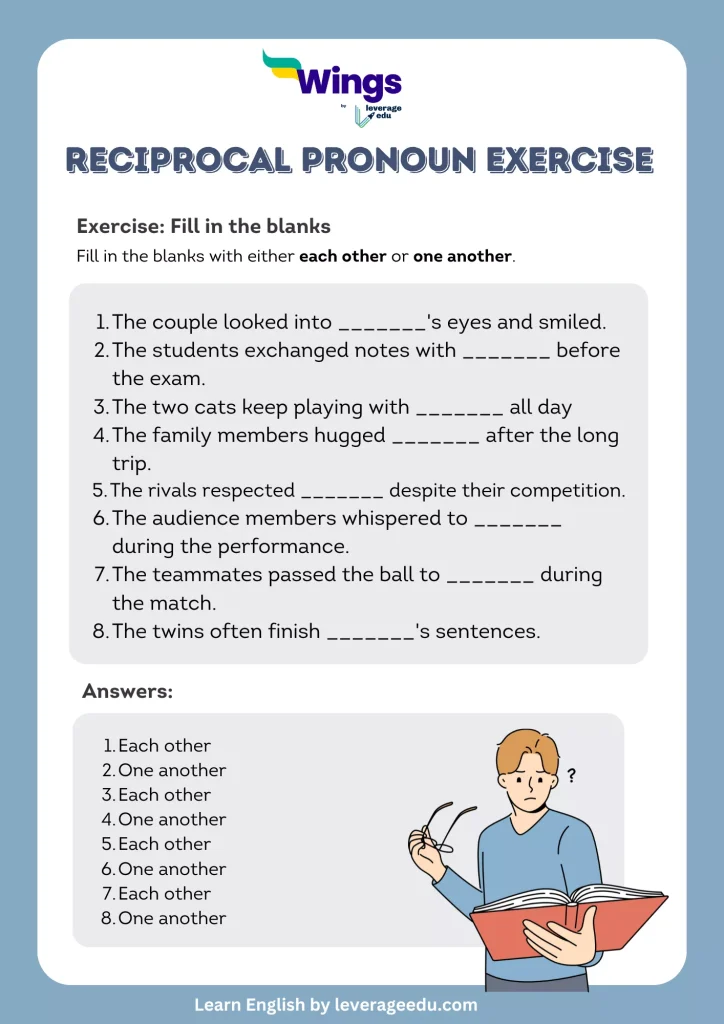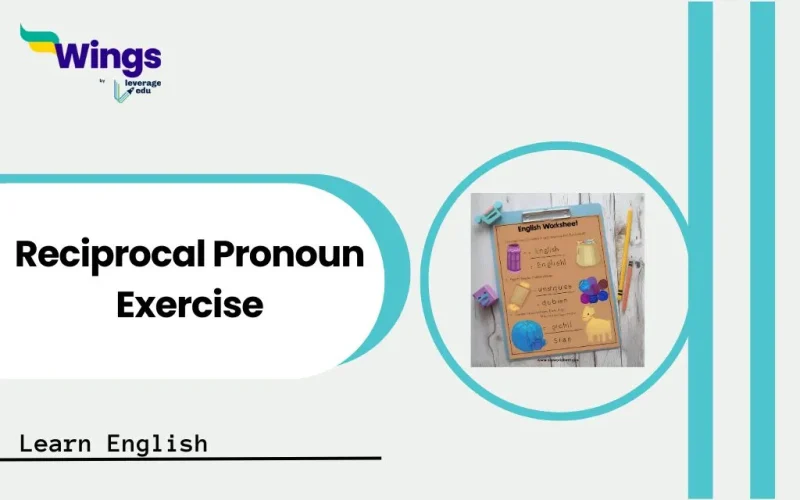The reciprocal pronoun exercise is a great way to understand how to express mutual actions between two or more people in a sentence. These exercises help learners use pronouns like each other and one another correctly, making sentences clearer and more natural. In this blog, you’ll find simple explanations, examples, and a free PDF download of reciprocal pronouns exercises to boost your grammar skills and confidence in English.
This Blog Includes:
What Are Reciprocal Pronouns?
Reciprocal pronouns are used when two or more people are performing an action that affects both (or all) of them equally. In English, there are only two reciprocal pronouns:
- Each other: Used when referring to two people.
- One another: Used when referring to more than two people.
These pronouns help avoid repetition in sentences, making them sound more natural and fluent.
Examples:
- Sarah and John love each other. (Instead of saying “Sarah loves John, and John loves Sarah.”)
- The team members encouraged one another during the match.
- The two best friends always help each other with their homework.
- The students in the class share their notes with one another.
Also Read: What are Reciprocal Pronouns: Definition, Examples
How To Use a Reciprocal Pronoun
Reciprocal pronouns simplify sentences by avoiding repetition while maintaining clarity. They indicate a mutual action between two or more people
- Using “each other” for more than two people: If the sentence refers to more than two individuals, “one another” is preferred.
- Incorrect: The classmates supported each other.
- Correct: The classmates supported one another.
- Using reciprocal pronouns without a subject: Remember that reciprocal pronouns must refer to a clear subject (a group or two individuals).
- Incorrect: Each other helped with the project.
- Correct: The colleagues helped each other with the project.
Practice Reciprocal Pronoun Exercise: Exercise 1
Now, it’s your turn! Fill in the blanks with either each other or one another.
- The two sisters always borrow clothes from _______.
- The players congratulated _______ after the game.
- We should all respect and support _______.
- The couple wrote love letters to _______.
- The employees in the office share their ideas with _______.
- The two brothers fought but later apologised to _______.
- The friends gave _______ gifts on their birthdays.
- The classmates helped _______ with their homework.
- The married couple takes care of _______ when they are sick.
- The team members trust _______ to complete their tasks.
- The two competitors admired _______’s skills in the tournament.
- The committee members consult with _______ before making decisions.
- The birds were chasing _______ in the sky playfully.
- My parents and I always support _______ in tough times.
- The two business partners rely on _______ for advice.
- The two friends always tease _______.
- The neighbours take care of _______’s pets when someone is away.
- The two sisters hugged ____ after the long trip.
- The classmates shared notes with ____ before the test.
- The dogs chased ____ around the yard.
- The teammates supported ____ during the match.
- The couple looked at ____ with love.
- The family members always help ____ in difficult times.
- The children in the group were laughing at ____.
- The students congratulated ____ after finishing the project.
- The bride and groom promised to care for ____.
- The neighbors always greet ____ warmly.
- The twins often borrow clothes from ____.
- During the game, the players encouraged ____.
- We should all respect ____ in a community.
Answers:
- Each other
- One another
- One another
- Each other
- One another
- Each other
- One another
- One another
- Each other
- One another
- Each other
- One another
- Each other
- One another
- Each other
- Each other
- One another
- each other
- one another
- each other
- one another
- each other
- one another
- one another
- one another
- each other
- each other
- each other
- one another
- one another
Also Read: What are Pronouns? Check Definition, Classification, Types
Exercise 2: Choose the Correct Option
Practice these multiple-choice questions to strengthen your understanding of how reciprocal pronouns are correctly used in real sentence contexts.
- The friends trusted
a) themselves
b) each other
c) himself - The team members blamed
a) one another
b) itself
c) himself - The two leaders respected
a) one another
b) each other
c) themselves - The classmates helped
a) himself
b) one another
c) itself - The brothers supported
a) each other
b) himself
c) themselves - The players encouraged
a) one another
b) itself
c) himself - The two rivals admired
a) themselves
b) each other
c) himself - The family members listened to
a) itself
b) one another
c) himself
Answers:
- b) each other
- a) one another
- b) each other
- b) one another
- a) each other
- a) one another
- b) each other
- b) one another
Also Read: Synonyms of Environment
Reciprocal Pronoun Exercise with Answers: Download Free Worksheet

Also Read: Synonyms of Household
Reciprocal pronouns play a vital role in expressing mutual actions clearly and correctly. By understanding the rules and practising regular reciprocal pronoun exercises, you can significantly improve your English grammar skills. Whether you are a student, teacher, or exam aspirant, mastering this topic will help you write more accurate and confident English.
FAQs
No, reciprocal pronouns always refer to at least two people or things, so they cannot be used in a singular form.
In casual conversation, they are often used interchangeably, but traditionally, “each other” is for two individuals, and “one another” is for groups larger than two.
Yes! For example: “They greeted each other warmly yesterday.”
Yes, they are used in sentences where a mutual action takes place, so they always accompany a verb.
A common mistake is using ‘each other’ for a group larger than two, which should be ‘one another.’
Related Reads:
We hope this blog on “Reciprocal Pronoun Exercise” helps you improve your English skills. You can also follow the Learn English page of Leverage Edu for more exciting and informative blogs related to English grammar and the English language.


 One app for all your study abroad needs
One app for all your study abroad needs












 60,000+ students trusted us with their dreams. Take the first step today!
60,000+ students trusted us with their dreams. Take the first step today!